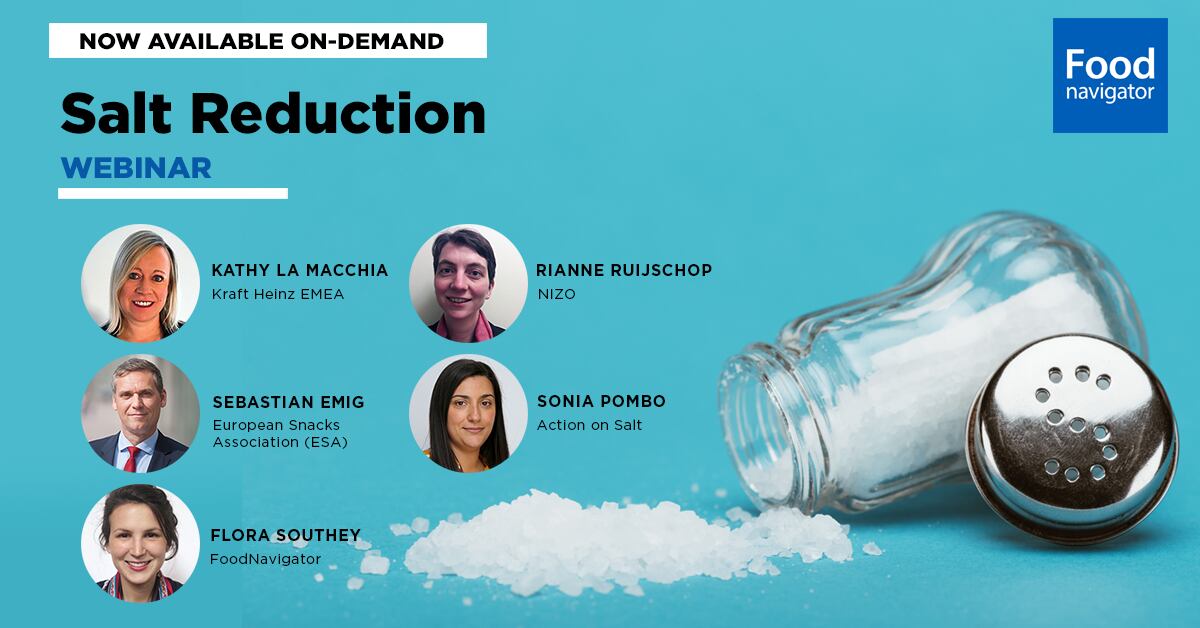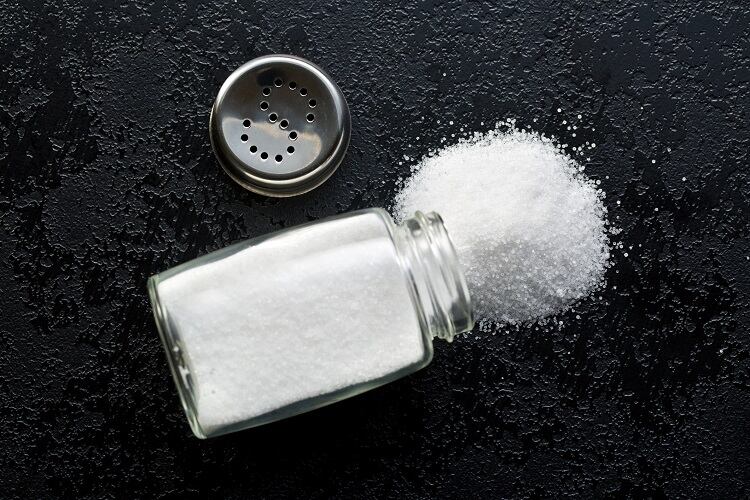Excessive salt consumption is a ‘worldwide problem’, according to UK campaign group Action on Salt.
In the UK, for example, where it is recommended people consume no more than 6g – equating to roughly one level teaspoon – of salt per day, average salt intake actually sits closer to 8.1g per day.
“It doesn’t sound like much more, but those small gram increases, compared to what we should be eating, are having a huge impact on our overall health,” said the not-for-profit’s Public Health Nutritionist and Campaign Manager, Sonia Pombo, during FoodNavigator’s Salt Reduction webinar last week.
Salt reduction, therefore, offers an important opportunity to improve population health. A diet too high in salt raises blood pressure and increases health risks. If the UK population were to cut its daily intake from 8.1g to the recommended 6g per day, it would reduce the number of strokes by 22% and heart attacks by 16%.
So where is this salt coming from? And how can governments and industry work to positively impact public health systems, all the while improving population health?
Salt: The very silent killer?
Salt is in ‘pretty much everything we eat’, said Action on Salt’s Pombo. “It is in everything we buy in the supermarkets and everything we eat in restaurants.”
Indeed, according to the European Commission, the majority of sodium intake (70-75%) comes from processed foods. Just 10-15% comes from naturally occurring sodium in unprocessed foods, and another 10-15% from salt added during cooking or eating.
The biggest contributing category for most western countries, including the UK, is perhaps unexpected: bread. Meats and cheese also contribute a significant amount of salt to western diets.
“Bread accounts for nearly one-fifth of our total salt intake,” explained Pombo. This, she suggested, can be difficult to get consumers’ heads around, as bread is not generally regarded a particularly salty product. “This is why it is difficult to convince people they really need to reduce their salt [intake], because they don’t know where their salt is coming from.”
In fact, what consumers may perceive to be ‘salty’ foods, such as savoury snacks, contribute a relatively small amount of sodium to consumer diets.
“Savoury snacks are not among the top ten largest contributors to dietary salt intake,” said General Director of the European Snacks Association (ESA) Sebastian Emig. Rather, in the snacks category, salt is generally applied to the surface of savoury snacks, which is why they taste salty, he explained.
Salt may also be added to the base recipe of some snacks to support the expansion process.
“There is about only 0.5g of salt in a 30g bag of salted potato crisps, which is approximately 7% of the reference intake of an average adult. [And] according to the latest figures in Europe, only 3% of the average overall dietary intake of salt derives from savoury snacks (less than 2% in the UK, and 1% in France and Spain, according to Euromonitor).”

Nevertheless, whether the salt is coming from bread, meat, cheese, or from excessive consumption of particularly salty savoury snacks, consumers are often unaware of the impact salt is having on their long-term health.
“Having a high salt diet doesn’t carry any symptoms per se,” Action on Salt’s Pombo explained. “Generally, [if you had] a chronic, high consumption of salt throughout your lifetime, you wouldn’t really know that it is effecting your health unless you were to get your blood pressure checked regularly.”
Are voluntary salt reduction targets enough?
As it stands, no EU-wide mandatory salt reduction targets exist. Certain Member States have trialled salt reduction legislation (including Portugal, Belgium, Greece, Hungary, and the Netherlands, predominantly in bread), but a majority continue to rely on voluntary measures.
Voluntary targets have achieved varying results. In the UK, for example, significant progress has been made since salt reduction targets were first published in 2006. Public Health England’s (PHE) most recent progress report, however, revealed ‘little progress’ between 2017 and 2018, according to senior scientist at the British Nutrition Foundation, Anne de la Hunty.
At the same time, de la Hunty told FoodNavigator that industry had observed ‘considerable success’ with salt reduction in recent years, and stressed that a number of categories – including bread, crisps and snacks, and fat spreads – met average targets, “showing that there have been improvements for some categories”.
It is also worth noting that as targets are reduced further, they become harder to meet.
When asked whether the ESA’s members would be supportive of mandatory salt reduction – in a similar vein to the UK’s sugar tax, which saw the amount of sugar sold in soft drinks drop by 29% between 2015 and 2018 – the lobby group’s Director General said “we are strong supporters of self- and co-regulation.
“This is not only because we represent an industry, but also because we have a few examples all over Europe, which are increasing, that show [that voluntary measures payoff].”
The EU Salt Reduction Framework monitors voluntary nutrients reduction, including sugar, fat, and salt, across the bloc. And these monitoring reports, said Emig, show that voluntary developments and actions at industry level work.
Further, voluntary measures allow for multisectoral collaboration, ESA’s Director General continued. Since Portugal first announced its salt tax project in 2018, it has since replaced this tax with a voluntary salt reduction programme.
Spain offers another example of a collaborative approach to meeting voluntary salt reduction targets. Spain’s Snack Association (formerly known as AFAP) kickstarted its reformulation programme, covering more than 13 categories, in 2018. “It is working with NGOs at the local level, as well as the Spanish Agency for Food Safety and Nutrition (AESAAN),” said Emig.“Here, we see the industry working together with NGOs, retailers, as well as the Government, hand-in-hand. It’s a real ‘whole society’ project [aimed] at reducing…salt in several categories.”

Mandatory measures, on the other hand, move too slowly, the Director General told delegates. Further, they can lack incentive to push manufacturers beyond set limits, he continued.
“[Nutrients reduction legislation] does not give real impetus to industry to work towards [a very reduced target]. Sometimes you can have categories (beyond savoury snacks) that easily reach the salt reduction [target] and then they just rest on their laurels, instead of further exploring opportunities in R&D to further reduce salt.
“So for us, the way forward is a whole society approach, together with NGOs, together with retailers, as well as governments, to follow the way of self- and co-regulation.”
Action on Salt: ‘We would like to see mandatory legislation’
Action on Salt, however, is not convinced. For campaign lead and Public Health Nutritionist Pombo, voluntary measures represent a ‘great starting point’. However, such measures are only effective if managed by ‘strong leadership’ via an independent body, she stressed.
When voluntary salt reduction strategies were first introduced in the UK, they were managed by the Food Standards Agency (FSA), which Pombo in part credits for early successes in meeting targets.
“That has since changed,” she said, referencing the transfer of responsibility from the FSA to the Department of Health in 2010.
“We have seen through the various progress reports that progress has slowed, for a variety of reasons, but most likely because of a lack of leadership. [In addition], there is much more self-reporting, no monitoring, and no significant pressure that has been put on the food industry.”
The ‘beauty’ of mandating targets is that it ‘creates a level playing field’, the Public Health Nutritionist told delegates. In the UK, Pombo observes certain food and drink companies progressing ‘much further’ than others. Retailers, for example, appear to be ‘doing a lot better’ than manufacturers.
“It’s not that they know something that the others don’t, I imagine the reason it could be is that they have a bigger interest in public health, so they’re doing much more around those areas. But by making it voluntary, it’s almost like you’re penalising these people for trying to do good and trying to progress further, because their competitors are not progressing [at the same rate].
“So it creates this imbalance, where they don’t want to reduce their products even more because then there will be a significant [gap between their salt levels and that of] their competitors’. Their consumers are going to notice and they’re going to start buying elsewhere.”
If mandatory targets were instated, however, all sectors would be forced to comply – including the out-of-home industry, which Pombo noted ‘has really been lagging behind here in the UK’.
“So in the case of the UK, we would like to see these targets being considered mandatory, particularly for leading contributors of salt in the diet.”
FoodNavigator’s webinar on Salt Reduction was broadcast on 23 September 2020.
The full panel discussion, including input from Kathy La Macchia, Head of Nutrition, Consumer Science and Culinary at Kraft Heinz EMEA and Rianne Ruijschop, Group Leader, Food Product Technology at NIZO, alongside Action on Salt’s Sonia Pombo and the ESA’s Sebastian Emig, can be heard on-demand for three months.
To listen to this free webinar, please register here.



